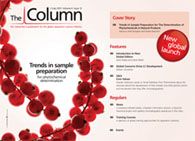Liquorice treats Allsorts
Weikang Bio-Technology Group, a Chinese manufacturer and marketer of traditional Chinese medicines, is launching a new project to research and develop liquorice flavonoids for use in therapeutics. For the study, the company reports that it intends to use supercritical carbon dioxide extraction technology to produce superior quality herbal extracts, column chromatography to isolate and purify compounds and HPLC to separate, identify and quantify compounds based on their idiosyncratic polarities.

Weikang Bio-Technology Group, a Chinese manufacturer and marketer of traditional Chinese medicines, is launching a new project to research and develop liquorice flavonoids for use in therapeutics. For the study, the company reports that it intends to use supercritical carbon dioxide extraction technology to produce superior quality herbal extracts, column chromatography to isolate and purify compounds and HPLC to separate, identify and quantify compounds based on their idiosyncratic polarities.
"We are extremely excited to launch the Liquorice Flavonoid Project which we believe will be one of the premier sources in China for research and development of extracting and use of glycyrrhetinic acid as a therapeutic. Through the use of our state-of-the-art technology we expect to be able to produce high quality therapeutics using this important medicinal compound," said Yin Wang, company chairman and CEO in a statement.
Liquorice contains glycyrrhetinic acid, which, in addition to being widely used as a flavouring agent, the company claims is effective in treating conditions and afflictions such as allergies, hepatitis, inflammation and swelling, including peptic ulcers, hypertension, excessive potassium in the body, skin conditions, viral infections, tumour formation and weight loss.
For more information on the company visit www.weikangbio.com
This story originally appeared in The Column. Click here to view that issue.
Reversed-Phases for LC Deliberately Doped with Positive Charge: Tips and Tricks for Effective Use
May 13th 2025In this month's edition of LC Troubleshooting, Dwight Stoll and his fellow researchers discuss both the benefits (improved peak shape/loading) and challenges (excessive interaction) associated with charge-doped reversed-phase (RP) columns for both analytical and preparative separations.
Investigating 3D-Printable Stationary Phases in Liquid Chromatography
May 7th 20253D printing technology has potential in chromatography, but a major challenge is developing materials with both high porosity and robust mechanical properties. Recently, scientists compared the separation performances of eight different 3D printable stationary phases.
Characterizing Polyamides Using Reversed-Phase Liquid Chromatography
May 5th 2025Polyamides can be difficult to characterize, despite their use in various aspects of everyday life. Vrije Universiteit Amsterdam researchers hoped to address this using a reversed-phase liquid chromatography (RPLC)-based approach.

.png&w=3840&q=75)

.png&w=3840&q=75)



.png&w=3840&q=75)



.png&w=3840&q=75)













